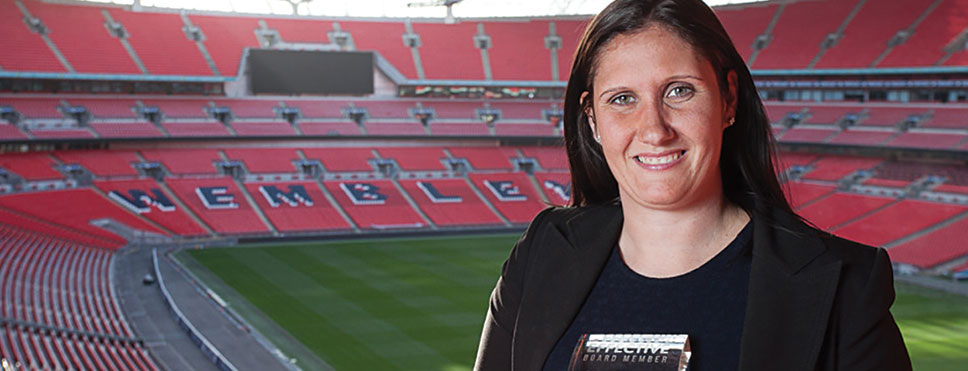RAISING THEIR GAME
Published twice a year, WLV Life is packed full of the latest University and alumni news and events, keeping you up-to-date with all the goings-on within your alumni community.
Each issue features engaging stories on different themes and we catch up with alumni old and new to find out what they have been up to since leaving the University.
http://www.wlv.ac.uk/alumni/news-and-publications/wlv-life-magazine/
Lecturer in Sports Coaching, Hannah Dingley, shares her thoughts on the recent successes of Great Britain’s sportswomen and why they should no longer be hidden from view.

The 2015 rugby World Cup was hugely disappointing for England. Not only was it England’s worst ever showing in a World Cup but they also became the first host nation not to progress past the group stages of the tournament.
In contrast England’s Women's Rugby team are the current World Champions, having won a hard-fought final against Canada 21-9 in front of a sell-out crowd in Paris last August. They also won 2014 BBC Sports Personality Team of the Year and the game is becoming more and more popular with record-breaking viewing figures of 1.6 million people tuning in to watch the World Cup semi-final between Canada and South Africa.
What made England’s success even more remarkable is that all of their players had to take time off from their day jobs to play in the tournament. The team contained a plumber, a vet, a mother, a lifeguard, a few teachers, students and a guitarist. It was only after their success in France that England's women rugby players are now being paid to play. 20 players have been handed professional contracts, allowing them to train full-time. Rugby 7s will also now feature in the Rio Olympics in 2016 which means that England will be able to compete on a level with other countries that have full-time players.
Women’s cricket in England has also celebrated the dawning of a fully professional era, with 18 players awarded contracts. Although they lost the Ashes in 2015, for the first time Sky Sports provided live television coverage of every ball, with the BBC covering it on radio. They also signed an historic sponsorship deal this year with Kia Motors, their first standalone sponsorship agreement.
England women’s Hockey team also won the EuroHockey Championships for the first time in 24 years this summer as they defeated the Netherlands 3-1 on penalties to triumph on home soil. The side were also the only GB team sport to medal in London 2012 and three years after their Olympic success, the sport is flourishing. There are now 180,000 regular players turning out for the 900 clubs across the country, with 25% more women and 55% more under-16s playing since 2011. For the elite players, that bronze medal also won the GB team a level of funding from UK Sport that means they can be paid as they train for their next major challenge – Rio 2016.
The England women's football team managed to secure a pay increase this season. Their central contacts with England are now worth £20,000 a year, an increase of £4,000, and it appears to be paying off as their bronze medal in the 2015 World Cup made them the most successful men’s or women’s England football team since 1966. While Wayne Rooney is on an estimated £300,000 a week, the best-paid women in England now earn around £50,000-£60,000 a year. The FA created the Women’s Super League (WSL) in 2011, and the players started making a living from their sport. Following this summer’s World Cup, women’s football in England has seen continued growth with attendance figures for the WSL up 48% this season. The BBC and BT Sport both covered the WSL as we saw Chelsea manager Emma Hayes, the only female manager in the top flight, lead Chelsea Ladies to their first title.
The USA who won the World Cup in Canada have a long established professional women’s soccer league, but they too saw increases in attendances off the back of this summer’s tournament with nearly a 22% increase from the previous season.
In September 2015, University of Wolverhampton Sport graduate Laura Harvey won National Women’s Soccer League (NWSL) Coach of the Year for the second consecutive season. Her Seattle Reign side won the NWSL Shield for the second year in a row. Laura is also one of four Britons, although the only female, in contention to be FIFA women's world coach of the year. Laura, and England boss Mark Sampson, are joined on a 10-person shortlist by Colin Bell (Frankfurt) and John Herdman (Canada).
In 2012, on the Olympic stage, Britain’s female athletes won dozens of medals, and their successes prompted more interest in women’s sport. Not only was London 2012 the most gender-equal games in history (although there were 30 fewer medals for women to win), the country woke up to the fact that inspirational sportswomen had been hidden from view for too long.
Young girls can now easily watch role models both live and on TV and be inspired by their skill level as professional athletes. What's more, they can actually make a living by playing team sports. Previously, this was only possible in individual events, such as tennis, golf or athletics.
However, on a final note, although female sport is gaining more publicity, where are the female coaches? A UK Sport (2013) report stated that only 30% of coaches in the UK are women, and although Team GB had the most female athletes ever competing at London 2012, only 7% of the Performance Directors were female. Examples such as Laura Harvey and Emma Hayes are few and far between and National Governing Bodies need to do more to not only support and develop women coaches, but to give them opportunities to prove themselves at the top level of sport.
Hannah Dingley
BSc (Hons) Sports Coaching Practice Course Leader
For more information please contact the Corporate Communications Team.


/prod01/wlvacuk/media/departments/digital-content-and-communications/images-2024/240328-Varsity-Line-Up-Resized.jpg)
/prod01/wlvacuk/media/departments/digital-content-and-communications/images-18-19/220325-Engineers_teach_thumbail.jpg)
/prod01/wlvacuk/media/departments/digital-content-and-communications/images-2024/240423-Additive-Research-Centre-Launched.jpg)
/prod01/wlvacuk/media/departments/digital-content-and-communications/images-2024/240320-Uzbekistan-Resized.jpg)
/prod01/wlvacuk/media/departments/digital-content-and-communications/images-2024/240229-The-Link-Resized.jpg)
/prod01/wlvacuk/media/departments/digital-content-and-communications/images-2024/240423-Arts-Connect-Resized.jpg)